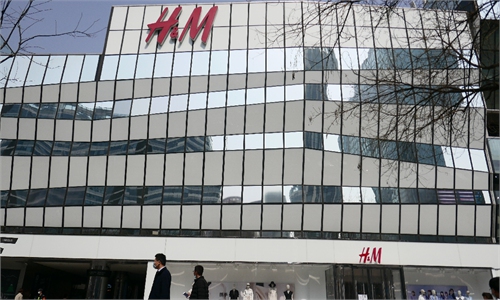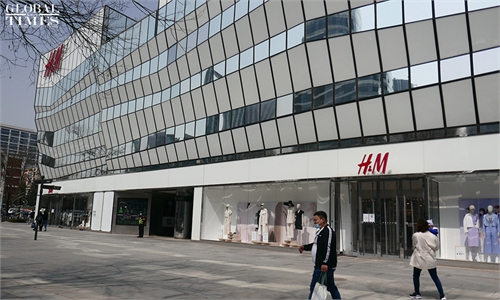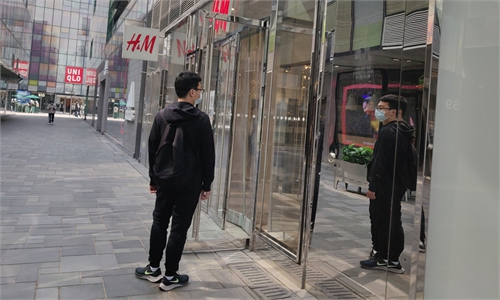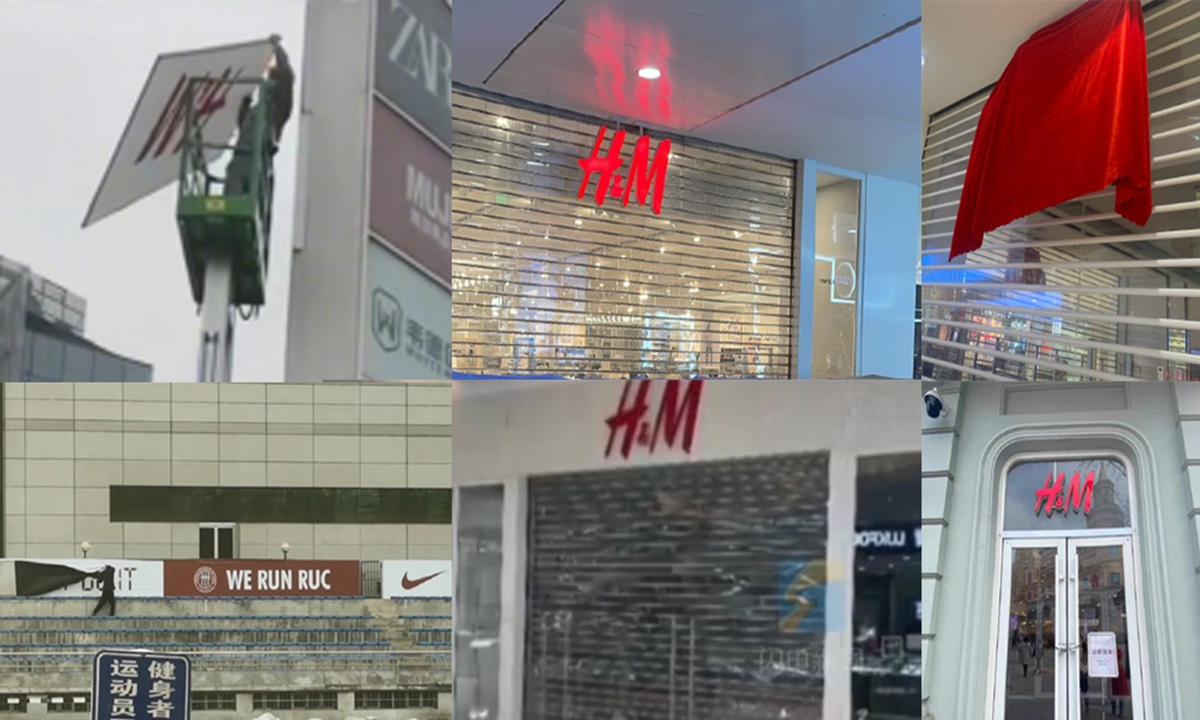
Combo photo of the closed H&M stores and the removal or covering up of H&M and Nike billboards. Photo: Weibo
Angry Chinese netizens are boycotting H&M, Nike and some other big Western apparel brands because of their provocative statements on Xinjiang affairs and banning Xinjiang cotton, a decision made by the brands based on lies.
The West fervently calls it China's state-backed cyber nationalism, but observers said the Chinese government is not behind the latest wave of boycotts and is striking a delicate balance between firmly maintaining the country's core interests and avoiding public opinion from hindering the interests.
In the past three days, Chinese netizens have been seen spontaneously expressing their affection for Xinjiang products and a firm attitude to defend national interests. Numerous users on China's Twitter-like Sina Weibo have forwarded and commented under the hashtag #ISuppotXinjiangCotton since the statements of those Western companies boycotting Xinjiang cotton surfaced on Wednesday, making it one of the most trending topics with more than 4.5 billion views and 28 million discussions on Weibo as of press time.
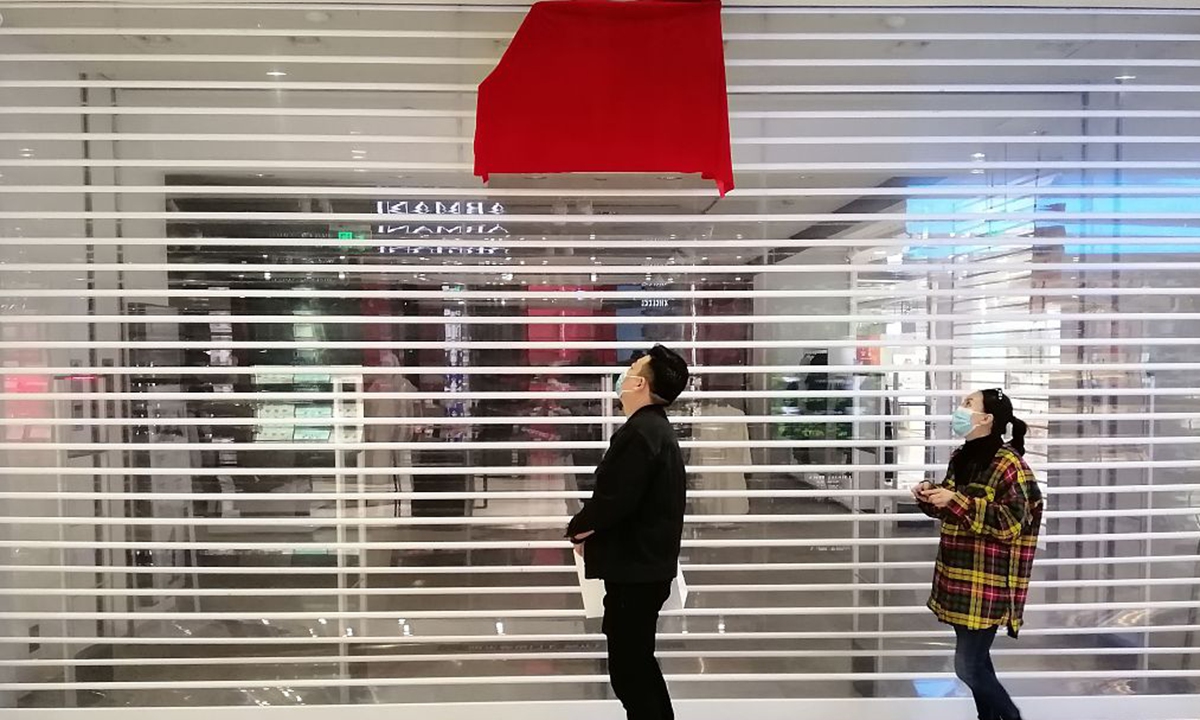
Photo: VCG
Rational, occasionally extreme reactions
"My winter clothes and quilts are made of Xinjiang cotton; they are so soft and warm," a Weibo user wrote on Friday, praising the good quality of Xinjiang's cotton products.
Another wrote, "To me, China's national interests are greater than all," adding that he has ordered Xinjiang cotton products on a shopping website.
"I don't know much about politics or business; I'm an ordinary Chinese person who simply and naturally loves his country," he wrote.
More than 30 Chinese celebrities including Wang Yibo, Zhang Yixing and Dilireba from Xinjiang have cut ties with brands like Nike and Adidas to show support for cotton products from Xinjiang in the wake of the latest controversy. Most H&M stores have been closed. An online video also showed that the Beijing-based Renmin University of China has scrapped all the Nike scrolls at its sports ground.
The Global Times also found a popular romantic drama, currently airing online, blurred the Nike logo of the leading actor's polo shirt. Celebrities were found wearing domestic brands or those without clear logos at airports, in contrast to Nike and Adidas sneakers that used to be popular in such situations.
Netizens praised the quick response as "awareness of the big picture" and knowing "national interest prioritizes commercial interests."
Nonetheless, the ways of Chinese expressing their love for the country differ, with some resorting to extreme words and deeds.
Under a growing sentiment of dissatisfaction and disappointment of Chinese customers with Western brands that made baseless accusations on Xinjiang, harsh words including "all foreign companies must get out of China" and "Chinese shouldn't use foreign products" occasionally occurred on social media.
Cases of individuals destroying products of involved brands, or verbally abusing staffers of their online and offline stores were also seen on the internet. In some short videos spread on Weibo and TikTok on Thursday and Friday, people cut H&M clothes or burned Nike shoes in front of the camera, while shouting, "I won't let you rumormongers grab my money anymore!"
Some netizens compared this incident to 2012 when some Chinese boycotted Japanese cars due to the Diaoyu Islands dispute. An owner of a Japanese car was seriously injured during the protest and the attacker was sentenced to 10 years in prison in 2013.
These radical remarks and behavior, which only account for a very tiny fraction of all the responses of the Chinese public, have been criticized by lots of netizens who disapprove of irrational acts, the Global Times has found.
Many appealed for "rational patriotism," calling to neither insult personnel of these brands' Chinese branches nor damage items in their stores.
"Please be a civilized, well-behaved citizen," a web user noted. "Violence is not a proper way to express your patriotism."
The West has put Xinjiang, among all topics of conflicts, to the highest and called China's policies in Xinjiang "genocide" together with other lies such as "forced labor." That label is stigmatization of all Chinese people, and the public's backlash is not surprising, Zhang Yiwu, a Peking University professor and Chinese social observer, told the Global Times on Friday.
The vigilance against violence or radicalization of the boycott demonstrated the rationality and restraint of the Chinese public.
Shen Yi, a professor at the School of International Relations and Public Affairs of Fudan University, told the Global Times that the Chinese people's reactions toward these Western companies have become more mature in their behavior and language used compared to the nationwide anti-Japanese protests in 2012.
It was a result of the improvement of overall national strength in military, economy and governance, Shen said, adding that the public should not be requested to be 100 percent rational, and the Chinese government did punish those who violated laws during the protests in 2012.
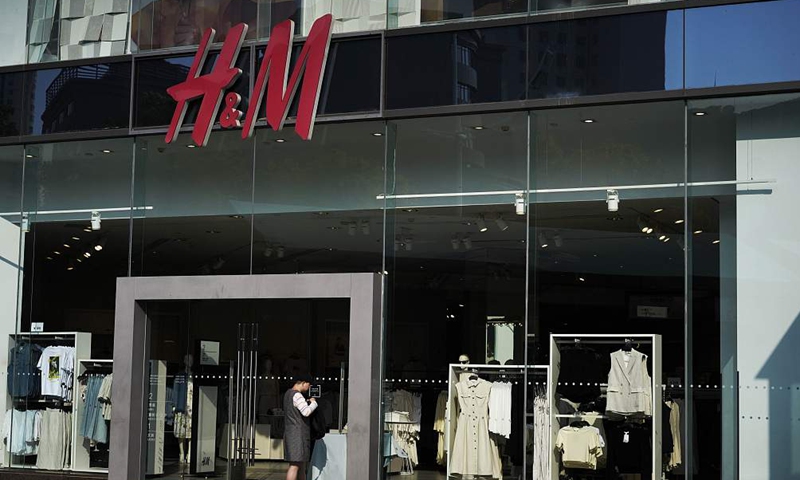
Photo: VCG
All about national interests
Many Chinese people have been to Xinjiang and fell in love with the region, which is less developed in China, and they understand that banning Xinjiang cotton will strangle the region's economy, drive local Uygurs as well as other ethnic groups back to poverty, and re-cultivate the soil for extremism and terrorism, Lü Xiang, a research fellow on US studies at the Chinese Academy of Social Sciences (CASS), told the Global Times Friday.
"They will not allow that to happen," Lü said.
While Western opinion tends to label the boycott actions of the Chinese as nationalism which could create risks for foreign businesses in China, the belief of the Chinese is that foreign companies, whether Western or Asian, should not eat Chinese food and smash Chinese bowls at the same time. For them, it is a matter of national sovereignty and the country's core interests, and hurting these equals hurting the affections of the Chinese people.
At the official level, China strongly opposed the mistakes some foreign businesses have made in banning Xinjiang cotton and defended the "practical actions" of Chinese consumers, a spokesperson of China's Ministry of Commerce said on Thursday.
But the spokesperson also said the Chinese government has always welcomed and supported normal business activities of multinational enterprises in China and their efforts to build an industrial supply chain in the country, which is consistent with China's long-held stance toward foreign companies. Observers believe the Chinese government is playing a balancing role to the public boycott of Western companies.
Zhang Jiadong, a professor at the Center for American Studies of Fudan University, told the Global Times Friday that the message China sends to the outside world needs to match China's national interests, as China still needs a favorable international business environment, and China's countermeasures should equate to how it is hurt.
"If the hurt comes from a foreign government, the Chinese government has to deal with it, and the public can pay attention to it without participating in it. But if the hurt is done by nongovernment organizations and targets the Chinese people's feelings, it is where the public can launch a crusade," said Zhang.
When public opinions and official stance are consistent, it naturally generates the current situation, Lü from CASS said.
Observers also noted that in this globalized era, tackling nationalism is a test to governors of all modern states.
China has rich experiences in this. As China grows, the Chinese public has gradually viewed China as a major power. Each time, China has done better than the previous period in coping with subtle nationalistic sentiments, said observers.
